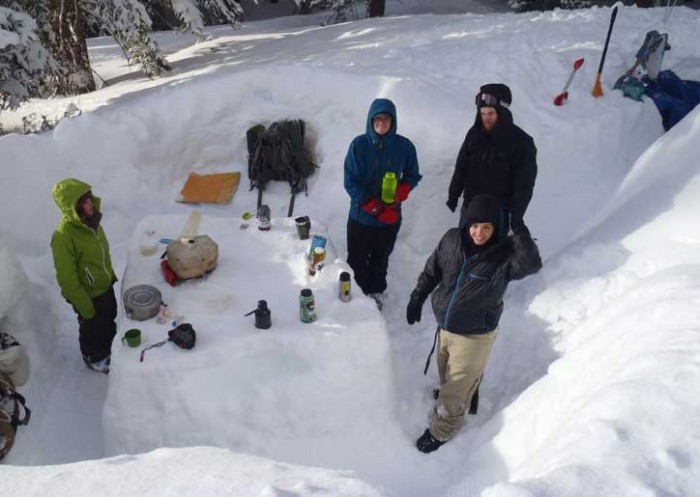
Photo courtesy of Inside Chico State, CSU, Chico’s faculty and staff newsletter.
A program designed to give students the skills and knowledge to teach outdoor leadership programs may face discontinuation Thursday.
The program, which led students to conduct fieldwork in wilderness survival in and out of California, was approved as an option in the kinesiology major in spring 2010 after similar coursework had existed as a certificate since 1997.
In May of 2012, enrollment for new students seeking to join the program was suspended.
The Academic Senate voted 17-15 on Feb. 27 to consider discontinuation of the program.
Prior to that vote, faculty members of the kinesiology department presented an outline of the proposal, which preceded a discussion between academic senators, faculty and former students of the program regarding the merits of the proposal.
The program was put up for discontinuation based on budgetary pressure, unnecessary safety risks, staffing restrictions and disproportionate costs compared to other programs, said Josh Trout, interim chair for the department of kinesiology.
These costs and restrictions are in a large part because of the field courses the program requires, according to the proposal.
“Quite simply, the Outdoor Education option requires more time and money to safely implement than our department has,” Trout said.
Reid Cross, kinesiology professor and creator of the program, questioned the reality of the budgetary problems presented, citing that no new field courses had been added since the program became an option.
Cross was put on academic leave in fall 2012. His dismissal from the campus restricted him from proposing and suggesting changes that could have turned the program around before discontinuation was necessary, he said. Cross’ suspension ended Mar. 3.
“Honestly, the problems are so small, they could be resolved so fast, with just open, honest dialogue,” Cross said. “And that did not happen.”
Academic senators raised questions about how faculty and student consultations were carried out prior to and during the program’s suspension. Though the kinesiology faculty maintained that they made every effort to conduct the suspension process fairly, several academic senators expressed concerns that the proposal wasn’t clear about what occurred between suspension and the proposed discontinuation.
Situations like those experienced during the suspension of Outdoor Education led to the adoption of suspension guidelines in August, said Jim Postma, chemistry professor and representative to the statewide academic senate. Departments and colleges must now follow the guidelines prior to suspending a program’s enrollment.
“I’m sure a lot of things happened that shouldn’t have, that won’t happen in the future because we have a good policy in place now,” Postma said. “But we didn’t then.”
Since the program was suspended prior to the adoption of the new guidelines, they weren’t applied to the process for Outdoor Education and can’t be made retroactively, said Paula Selvester, chair of the Academic Senate.
Prior to the program’s suspension, 34 students were enrolled in the option in fall 2012, according to the proposal. About five students remain while others have graduated.
The department intends to teach-out students still currently in the program through alternative coursework or external providers whether or not the program is discontinued.
As an alternative to the “Practicum in Outdoor Education,” a 35-day course meant to simulate a long-term expedition, students will be taught through similar programs held by the National Outdoor Leadership School, Outward Bound or courses offered by other universities, according to the proposal.
After the Academic Senate concludes discussion and holds a final vote, which may occur at Thursday’s meeting, their recommendation will be sent to Chico State President Paul Zingg, who will make a final decision on the fate of the program.
If Zingg does not approve the proposal the program will remain suspended, pending efforts to revive the program or another effort to discontinue it.
After the Academic Senate concludes discussion and holds a final vote, which may occur at Thursday’s meeting, their recommendation will be sent to Belle Wei, provost and vice president for academic affairs, who will make a final decision on the fate of the program.
If Wei does not approve the proposal the program will remain suspended, pending efforts to revive the program or another effort to discontinue it.
Nicholas Carr can be reached at [email protected] or @nikecarr on Twitter.
This article originally stated that Chico State President Paul Zingg would make a deliberation on whether or not the option in Outdoor Education would be discontinued following the Academic Senate’s recommendation. Belle Wei, provost and vice president for academic affairs, will make that decision.








